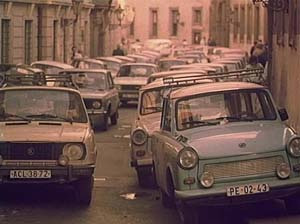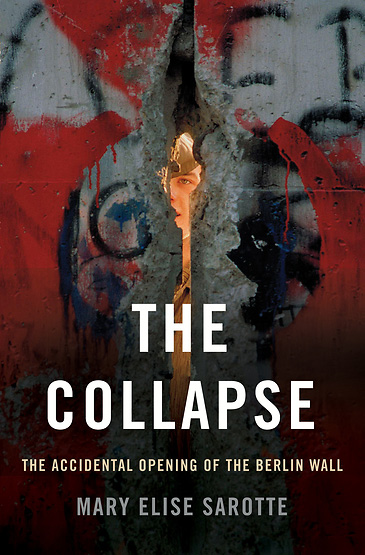Documents show accident and contingency, anxiety in world capitals
East German crowds led the way, with help from Communist fumbles,
self-fulfilling TV coverage, Hungarian reformers, Czechoslovak
pressure, and Gorbachev's non-violence
National Security Archive Electronic Briefing Book No. 490
Posted November 9, 2014For more information contact:
Thomas Blanton and Svetlana Savranskaya - 202/994-7000, nsarchiv@gwu.edu
----------------
Washington, DC, November 9, 2014 – The
iconic fall of the Berlin Wall 25 years ago today shocked international
leaders from Washington to Moscow, London to Warsaw, as East German
crowds
took advantage of Communist Party fumbles to break down the Cold War's
most symbolic barrier, according to formerly secret documents from
Soviet, German,
U.S., Czechoslovak and Hungarian files posted today by the National
Security Archive at George Washington University (www.nsarchive.org).
The historic events of the night of November 9, 1989 came about from
accident and contingency, rather than conspiracy or strategy, according
to the
documents. Crowds of East Berliners, already conditioned by months of
refugee flights to the West and weeks of peaceful mass protests in
cities like
Leipzig, seized on media reports of immediate changes in travel
restrictions — based on a bumbled briefing by a Politburo member, Gunter
Schabowski — and
inundated the Wall's checkpoints demanding passage. Television
coverage of the first crossing that yielded to the self-fulfilling media
prophecy then
created a multiplier effect and more crowds came, ultimately to dance
on the Wall.
The documents show that the actual collapse of the Wall began with
Hungarian Communist reformers who proposed in early 1989 to open their
borders to the
West, while seeking particularly West German foreign investment to
solve Hungary's economic crisis. Hungarian Communist leaders checked in
with Soviet
general secretary Mikhail Gorbachev in March 1989, letting him know
they planned to take down the barbed wire; and Gorbachev — true to his
"common European
home" rhetoric — responded only that "we have a strict regime on our
borders, but we are also becoming more open." (Document 1) The Hungarian decision sparked a stream
and then a flood of East German refugees.

Abandoned East German Trabants
line the streets of Prague.
Gorbachev himself unintentionally gave a signal that the Wall could
fall in his press conference on June 15, 1989 after a successful visit
to West Germany,
where in response to a question about the Wall, he said that "nothing
[was] permanent under the Moon" and connected German rapprochement to
the building of
the common European home. In fact, his conversations with Kohl and
other members of the West German government created a real breakthrough
in Soviet-FRG
relations, which would stand Kohl in good stead in the difficult
reunification talks during the next year (Document 2).
Gorbachev especially reinforced the theme of
European unity in his speech to the European Parliament in Strasbourg
where he presented his vision of the common European home on July 7,
1989. After
speaking about an essentially united Europe based on universal human
values, it would be hard to argue in favor of its continued division.
By August 1989, the Hungarian-initiated refugee crisis had become so
acute that the West German embassy in Budapest had to shut down, unable
to handle the
hundreds of East Germans camped out there for visas. On August 19,
Hungarian reformers even hosted a "Pan-European picnic" near the
Austrian border, after
which some 300 East Germans high-tailed across the former Iron Curtain.
The subsequent negotiations on August 25, 1989 between Hungarian
Communist leaders
with West German chancellor Helmut Kohl and foreign minister
Hans-Dietrich Genscher show the Hungarian calculation that only the
deutschmark could save
them, and by mid-September the Hungarians lifted all East-West controls
(Document 3).

East German demonstrators take to the streets in Leipzig, October 9, 1989.
Other world leaders were not at all eager for the Wall to fall, notably
the British prime minister, Margaret Thatcher, who told Gorbachev on
September 23 to
ignore those NATO communiqués about German unification, that even her
buddy, U.S. president George H. W. Bush opposed that kind of change (she
would
be wrong, when the time came. See document 4).
As Gorbachev later commented to his Politburo on November 3, the West
did not want German unification, but it wanted to prevent it "with our
hands, to push us against the FRG" so as to head off any future
Soviet-German cooperation — but Gorbachev believed European integration
was
the ultimate solution to Soviet economic problems (Document 6).
Czechoslovakia was closer to East Germany than Hungary was, and after
Hungary opened its gates, Prague quickly filled with East Germans
willing to dump
their Trabant cars in the streets for a chance to clamber over an
embassy wall and flee to the West. By November 8, Prague had become so
choked with East
Germans that the hard-line Czechoslovak Communist Party's Central
Committee made a demarche to East Berlin demanding they open their
borders — a moment of
pressure from fellow Communists that played a key role in the East
German party's decision to announce revised travel regulations the next
day (Document 7).
The draft regulations were full of temporizing language and largely
intended to let off steam while kicking the emigrant problem down the
road. East
Germans would have to apply for visas, and the vast majority who
lacked passports would have to wait even longer for those. But the
presentation of the new
regulations came at the very end of a botched press conference from 6
to 7 p.m. Berlin time on November 9
by SED Politburo member Gunter Schabowski, who did not know the
back story, the hedges, the limitations meant by the drafters of the
documents. Visibly rattled from the shouted questions about travel and
the Wall,
Schabowski read from his briefing papers the words "immediately,
without delay" when asked about the timing of the changes that would
allow any East German
to emigrate (Document 9).
Television news and the wire services as well promptly announced the
opening of the borders, and in a kind of self-fulfilling prophecy
reinforced by TV
coverage, crowds of East Germans massed at the border crossings and
ultimately persuaded the senior official at the largest inner-city
checkpoint at
Bornholmer Strasse to open the gates (a story told in fresh detail by
Mary Elise Sarotte in her new book, The Collapse: The Accidental Opening of the Berlin Wall).
Once Bornholmer opened, other crossings soon followed; and within
hours, people were
chipping off souvenir fragments from the concrete panels formerly
surrounded by a "death strip" in which earlier Wall jumpers had died.
So unexpected was the Wall opening that Helmut Kohl himself was not
even in the country. Instead, the West German chancellor had gone to
Warsaw to meet the
new Solidarity leaders of that country, and work out some long-standing
Polish-German tensions. The transcript of Kohl's discussions with Lech
Walesa show
the Polish leader complaining that events in East Germany were simply
moving too fast, and even predicting, presciently, that the Wall would
fall in a week
or two — at which point Kohl would have no time (or money) for poor
Poland (Document 8).
In Washington, the George H. W. Bush White House greeted the fall of
the Wall not with joy or triumphalism (that would come much later, when
the President
was running for re-election in 1992), but anxiety and even fear about
instability. When questioned by reporters why he did not show more
elation, President
Bush replied, "I am not an emotional kind of guy." (Document 10)
Bush's caution and prudence were appreciated in Moscow, where
Gorbachev's messages to Kohl centered on preventing chaos and reducing
instability, keeping
"others within limits that are adequate for the time being…." (Document 11)
But at Gorbachev's side, his foreign policy adviser Anatoly Chernyaev
in private let loose with one of the very few high-level expressions of
real joy
about the fall of the Berlin Wall. Chernyaev's diary entry for November
10, 1989 (Document 12) contains the coda for the demise of the Iron Curtain, "the end of Yalta" and the
Stalinist system, and a good thing, about time, in Chernyaev's remarkable view.


No hay comentarios:
Publicar un comentario